
Unlock a More Youthful You With Hormone Replacemment Therapy In Delaware, NJ
Aging is inevitable, and for many, it signals the beginning of a new chapter - one where you cross off bucket list items and live life to the fullest, on your own terms. However, for some women, aging is a horrible prospect, filled with chronic fatigue, irritability, and inability to perform in the bedroom. If you're concerned about life in middle age and beyond, we've got great news: there are easy, proven steps that you can take to help stop the negative effect of aging.
Global Life Rejuvenation was founded to give women a new lease on life - one that includes less body fat, fewer mood swings, and more energy as you age. If you're ready to look and feel younger, it's time to consider HRT (hormone replacement therapy), and growth hormone peptides. These therapies for men and women are effective, safe, and customized to fit your goals, so you can keep loving life as you get older.
HRT, and growth hormone peptide therapies bridge the gap between your old life and the more vibrant, happier version of you. With a simple click or call, you can be well on your way to a brighter future. After all, you deserve to be the one in charge of your wellness and health. Now, you have the tools to do so - backed by science and applied by our team of HRT experts with more than 13 years of experience.
What is HRT?
As women age, their hormones begin to go through changes that affect their day-to-day lives. For women, hormone deficiency and imbalance usually occur during menopause and can cause chronic fatigue, hot flashes, and mood swings, among other issues. Hormone replacement therapy helps correct hormone imbalances in women, helping them feel more vibrant and virile as they age.
Often, HRT treatments give patients enhanced quality of life that they didn't think was possible - even in their 60's and beyond.
The benefits for women are numerous and are available today through Global Life Rejuvenation.
HORMONE REPLACEMENT THERAPY
HRT and Anti-Aging Medicine for Women in Delaware, NJ
As women age, their bodies begin to go through significant changes that affect their quality of life. This change is called menopause and marks the end of a woman's menstrual cycle and reproduction ability. Though there is no specific age when this change occurs, the average age of menopause onset is 51 years old. However, according to doctors, menopause officially starts 12 months after a woman's final period. During the transition to menopause, women's estrogen and other hormones begin to deplete.
As that happens, many women experience severe symptoms. These symptoms include:
- Hot Flashes
- Chronic Fatigue
- Incontinence
- Trouble Sleeping
- Dryness
- Muscle Loss
- Fat Gain
- Mood Swings
The symptoms of hormone deficiency can be concerning and scary for both women and their spouses. However, if you're getting older and notice some of these symptoms, there is reason to be hopeful. Hormone replacement therapy and anti-aging medicine for women can correct imbalances that happen during menopause. These safe, effective treatments leave you feeling younger, healthier, and more vibrant.


What Causes Menopause?
The most common reason for menopause is the natural decline in a female's reproductive hormones. However, menopause can also result from the following situations:
Oophorectomy: This surgery, which removes a woman's ovaries, causes immediate menopause. Symptoms and signs of menopause in this situation can be severe, as the hormonal changes happen abruptly.
Chemotherapy: Cancer treatments like chemotherapy can induce menopause quickly, causing symptoms to appear shortly after or even during treatment.
Ovarian Insufficiency: Also called premature ovarian failure, this condition is essentially premature menopause. It happens when a woman's ovaries quit functioning before the age of 40 and can stem from genetic factors and disease. Only 1% of women suffer from premature menopause, but HRT can help protect the heart, brain, and bones.
Common Issues for Women During Menopause
For many women, menopause is a trying time that can be filled with many hormonal hurdles to jump through. A little knowledge can go a long way, whether you're going through menopause now or are approaching "that" age.
Here are some of the most common issues that women experience during menopause:
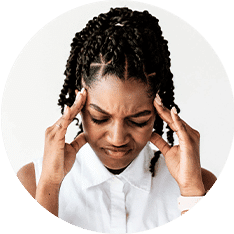
Depression
If you're a woman going through menopause and find that you have become increasingly depressed, you're not alone. It's estimated that 15% of women experience depression to some degree while going through menopause. What many women don't know is that depression can start during perimenopause, or the years leading up to menopause.
Depression can be hard to diagnose, especially during perimenopause and menopause. However, if you notice the following signs, it might be time to speak with a physician:
- Mood Swings
- Inappropriate Guilt
- Chronic Fatigue
- Too Much or Too Little Sleep
- Lack of Interest in Life
- Overwhelming Feelings
Remember, if you're experiencing depression, you're not weak or broken - you're going through a very regular emotional experience. The good news is that with proper treatment from your doctor, depression isn't a death sentence. And with HRT and anti-aging treatment for women, depression could be the catalyst you need to enjoy a new lease on life.
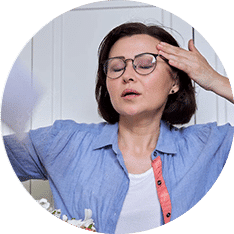
Hot Flashes
Hot flashes - they're one of the most well-known symptoms of menopause. Hot flashes are intense, sudden feelings of heat across a woman's upper body. Some last second, while others last minutes, making them incredibly inconvenient and uncomfortable for most women.
Symptoms of hot flashes include:
- Sudden, Overwhelming Feeling of Heat
- Anxiety
- High Heart Rate
- Headache
- Nausea
- Dizziness
Typically, hot flashes are caused by a lack of estrogen. Low estrogen levels negatively affect a woman's hypothalamus, the part of the brain that controls body temperature and appetite. Low estrogen levels cause the hypothalamus to incorrectly assume the body is too hot, dilating blood vessels to increase blood flow. Luckily, most women don't have to settle for the uncomfortable feelings that hot flashes cause. HRT treatments for women often stabilize hormones, lessening the effects of hot flashes and menopause in general.

Mood Swings
Mood swings are common occurrences for most people - quick shifts from happy to angry and back again, triggered by a specific event. And while many people experience mood swings, they are particularly common for women going through menopause. That's because, during menopause, the female's hormones are often imbalanced. Hormone imbalances and mood swings go hand-in-hand, resulting in frequent mood changes and even symptoms like insomnia.
The rate of production of estrogen, a hormone that fluctuates during menopause, largely determines the rate of production the hormone serotonin, which regulates mood, causing mood swings.
Luckily, HRT and anti-aging treatments in Delaware, NJ for women work wonders for mood swings by regulating hormone levels like estrogen. With normal hormone levels, women around the world are now learning that they don't have to settle for mood swings during menopause.

Weight Gain
Staying fit and healthy is hard for anyone living in modern America. However, for women with hormone imbalances during perimenopause or menopause, weight gain is even more serious. Luckily, HRT treatments for women coupled with a physician-led diet can help keep weight in check. But which hormones need to be regulated?
- Estrogen: During menopause, estrogen levels are depleted. As such, the body must search for other sources of estrogen. Because estrogen is stored in fat, your body believes it should increase fat production during menopause. Estrogen also plays a big part in insulin resistance, which can make it even harder to lose weight and keep it off.
- Progesterone: Progesterone levels are also depleted during menopause. Progesterone depletion causes bloating and water retention, while loss of testosterone limits the body's ability to burn calories.
- Ongoing Stress: Stress makes our bodies think that food is hard to come by, putting our bodies in "survival mode". When this happens, cortisol production is altered. When cortisol timing changes, the energy in the bloodstream is diverted toward making fat. With chronic stress, this process repeatedly happens, causing extensive weight gain during menopause.

Low Libido
Lowered sexual desire - three words most men and women hate to hear. Unfortunately, for many women in perimenopausal and menopausal states, it's just a reality of life. Thankfully, today, HRT and anti-aging treatments Delaware, NJ can help women maintain a normal, healthy sex drive. But what causes low libido in women, especially as they get older?
The hormones responsible for low libido in women are progesterone, estrogen, and testosterone.
Progesterone production decreases during perimenopause, causing low sex drive in women. Lower progesterone production can also cause chronic fatigue, weight gain, and other symptoms. On the other hand, lower estrogen levels during menopause lead to vaginal dryness and even vaginal atrophy or loss of muscle tension.
Lastly, testosterone plays a role in lowered libido. And while testosterone is often grouped as a male hormone, it contributes to important health and regulatory functionality in women. A woman's testosterone serves to heighten sexual responses and enhances orgasms. When the ovaries are unable to produce sufficient levels of testosterone, it often results in a lowered sex drive.
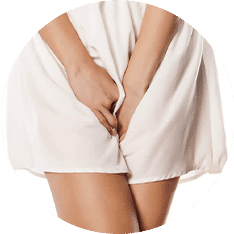
Vaginal Dryness
Often uncomfortable and even painful, vaginal dryness is a serious problem for sexually active women. However, like hair loss in males, vaginal dryness is very common - almost 50% of women suffer from it during menopause.
Getting older is just a part of life, but that doesn't mean you have to settle for the side effects. HRT and anti-aging treatments for women correct vaginal dryness by re-balancing estrogen, progesterone, and testosterone. When supplemented with diet and healthy living, your vagina's secretions are normalized, causing discomfort to recede.

Fibroids
Uterine fibroids - they're perhaps the least-known symptom of menopause and hormone imbalances in women. That's because these growths on the uterus are often symptom-free. Unfortunately, these growths can be cancerous, presenting a danger for women as they age.
Many women will have fibroids at some point. Because they're symptomless, they're usually found during routine doctor exams. Some women only get one or two, while others may have large clusters of fibroids. Because fibroids are usually caused by hormone imbalances, hysterectomies have been used as a solution, forcing women into early menopause.
Advances in HRT and anti-aging medicine for women give females a safer, non-surgical option without having to experience menopause early. At Global Life Rejuvenation, our expert physicians will implement a customized HRT program to stabilize your hormones and reduce the risk of cancerous fibroid growth.
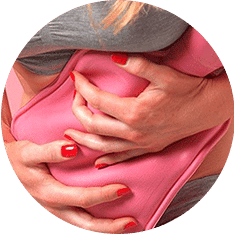
Endometriosis
Endometriosis symptoms are much like the effects of PMS, and include pelvic pain, fatigue, cramping, and bloating. While doctors aren't entirely sure what causes this painful, uncomfortable condition, most agree that hormones - particularly xenoestrogens - play a factor.
Endometriosis symptoms are much like the effects of PMS and include pelvic pain, fatigue, cramping, and bloating. While doctors aren't entirely sure what causes this painful, uncomfortable condition, most agree that hormones - particularly xenoestrogens - play a factor.
Xenoestrogen is a hormone that is very similar to estrogen. Too much xenoestrogen is thought to stimulate endometrial tissue growth. HRT for women helps balance these hormones and, when used with a custom nutrition program, can provide relief for women across the U.S.
Is HRT for Women the Right Answer?
Hormone stability is imperative for a healthy sex drive and for a normal, stress-free life during menopause. HRT and anti-aging treatments for women balance the hormones that your body has altered due to perimenopause or menopause.
HRT for women is a revolutionary step in helping women live their best lives, even as they grow older. However, at Global Life Rejuvenation, we know that no two patients are the same. That's why we specialize in holistic treatments that utilize HRT, combined with healthy nutrition, supplements, and fitness plans that maximize hormone replacement treatments.
If you've been suffering through menopause, is HRT the answer? That's hard to say without an examination by a trusted physician, but one thing's for sure. When a woman balances her hormone levels, she has a much better shot at living a regular life with limited depression, weight gain, mood swings, and hot flashes.
Here are just a few additional benefits of HRT and anti-aging treatments for females:
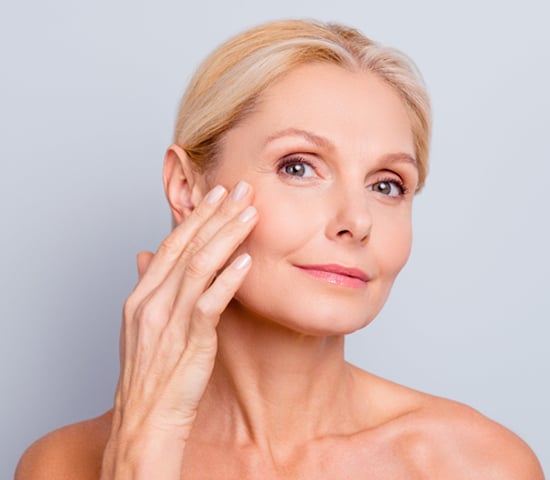

Benefits of HRT and Anti-Aging Medicine for Women in Delaware, NJ
Hormone imbalance causes a litany of issues. But with anti-aging treatments for women, females can better process calcium, keep their cholesterol levels safe, and maintain a healthy vagina. By replenishing the body's estrogen supply, HRT can relieve symptoms from menopause and protect against osteoporosis. But that's just the start.
Global Life Rejuvenation's patients report many more benefits of HRT and anti-aging medicine for women:
- Fewer Mood Swings
- Thicker Hair
- Stronger Bones
- Less Body Fat
- More Energy
- More Stamina
- Increased Sex Drive and Pleasure Sensations
- Better Cognitive Functions
- Improved Pain Receptors
- Less Hot Flashes and Night Sweats
- Lower Triglycerides
- Fewer Bladder Infections
If you're ready to feel better, look better, and recapture the vitality of your youth, it's time to contact Global Life Rejuvenation. It all starts with an in-depth consultation, where we will determine if HRT and anti-aging treatments for women are right for you. After all, every patient's body and hormone levels are different. Since all our treatment options are personalized, we do not have a single threshold for treatment. Instead, we look at our patient's hormone levels and analyze them on a case-by-case basis.

HRT from Global Life Rejuvenation
At Global Life Rejuvenation, we help women rediscover their youth with HRT treatment for women. We like to think of ourselves as an anti-aging concierge service, guiding and connecting our patients to the most qualified HRT physicians available. With customized HRT treatment plan for women, our patients experience fewer menopausal symptoms, less perimenopause & menopause depression, and often enjoy a more youth-like appearance.
Reverse Aging with Growth Hormone Peptides
Growth hormone peptides are an innovative therapy that boosts the natural human growth hormone production in a person's body. These exciting treatment options help slow down the aging process and give you a chance at restoring your youth.
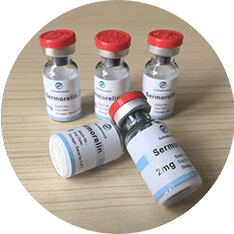
What is Sermorelin?
Sermorelin is a synthetic hormone peptide, like GHRH, which triggers the release of growth hormones. When used under the care of a qualified physician, Sermorelin can help you lose weight, increase your energy levels, and help you feel much younger.

Benefits of Sermorelin
Human growth hormone (HGH) therapy has been used for years to treat hormone deficiencies. Unlike HGH, which directly replaces declining human growth hormone levels, Sermorelin addresses the underlying cause of decreased HGH, stimulating the pituitary gland naturally. This approach keeps the mechanisms of growth hormone production active.
- Benefits of Sermorelin include:
- Better Immune Function
- Improved Physical Performance
- More Growth Hormone Production
- Less Body Fat
- Build More Lean Muscle
- Better Sleep
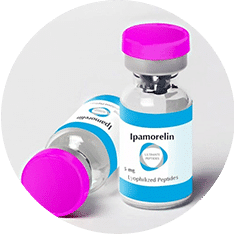
What is Ipamorelin?
Ipamorelin helps to release growth hormones in a person's body by mimicking a peptide called ghrelin. Ghrelin is one of three hormones which work together to regulate the growth hormone levels released by the pituitary gland. Because Ipamorelin stimulates the body to produce growth hormone, your body won't stop its natural growth hormone production, which occurs with synthetic HGH.
Ipamorelin causes growth hormone secretion that resembles natural release patterns rather than being constantly elevated from HGH. Because ipamorelin stimulates the natural production of growth hormone, our patients can use this treatment long-term with fewer health risks.

Benefits of Ipamorelin
One of the biggest benefits of Ipamorelin is that it provides significant short and long-term benefits in age management therapies. Ipamorelin can boost a patient's overall health, wellbeing, and outlook on life.
When there is an increased concentration of growth hormone by the pituitary gland, there are positive benefits to the body. Some benefits include:
- Powerful Anti-Aging Properties
- More Muscle Mass
- Less Unsightly Body Fat
- Deep, Restful Sleep
- Increased Athletic Performance
- More Energy
- Less Recovery Time for Training Sessions and Injuries
- Enhanced Overall Wellness and Health
- No Significant Increase in Cortisol
Your New, Youthful Lease on Life with HRT for Women
Whether you are considering our HRT and anti-aging treatments for women in Delaware, NJ, we are here to help. The first step to reclaiming your life begins by contacting Global Life Rejuvenation. Our friendly, knowledgeable HRT experts can help answer your questions and walk you through our procedures. From there, we'll figure out which treatments are right for you. Before you know it, you'll be well on your way to looking and feeling better than you have in years!
 866-793-9933
866-793-9933
Request a Consultation
Latest News in Delaware, NJ
Delaware Tribe members teach Paterson students about their Lenape heritage
Joe Malinconicohttps://www.northjersey.com/story/news/paterson-press/2023/11/24/paterson-nj-delaware-tribe-members-share-lenape-heritage/71679832007/
PATERSON — For Jeremy Johnson, a recent trip to three city elementary schools was an opportunity to share his Lenape heritage in a place he calls his “homelands.”Johnson and the other four members of a delegation from the Delaware Tribe of Indians performed a traditional tribal dance, told a folktale that predated European colonization of the area now known as New Jersey, and presented students with a slide show detailing the cultural symbols and history of the Lenape people.“It's importan...
PATERSON — For Jeremy Johnson, a recent trip to three city elementary schools was an opportunity to share his Lenape heritage in a place he calls his “homelands.”
Johnson and the other four members of a delegation from the Delaware Tribe of Indians performed a traditional tribal dance, told a folktale that predated European colonization of the area now known as New Jersey, and presented students with a slide show detailing the cultural symbols and history of the Lenape people.
“It's important to share this so that we are remembered in our homelands, and it’s also a way to get our community members out to share what they know about our people,” said Johnson, cultural education director for the Delaware Tribe of Indians.
“It’s something that needs to be carried on because we have been largely forgotten in our homelands,” Johnson added. “This program is a means for our people to remain attached to our homelands so that we still have a place here to come back to.”
National Park Service partnered with Delaware Tribe, Paterson schools
The National Park Service partnered with the Delaware Tribe and the Paterson school district to make the program happen. Johnson and his group visited fourth graders at School 1, School 2 and School 28 last week.
“The National Park Service is constantly improving the ways we tell the stories of this country,” said Ilyse Goldman, a ranger at Great Falls National Historical Park. “The Indigenous people of this land have not played as prominent a role, but we’re trying to correct that wrong now as an agency. Having a relationship with all of the federally recognized tribes of the Lenape is correcting the myths; it’s remembering that native people were and are here.”
Schools Superintendent Laurie Newell, who attended the School 28 session, talked about the value of the program.
“There are parts of American history that our children must become more familiar with in order to fully appreciate the rich traditions to be found here,” Newell said. "The Lenape people’s words are all over New Jersey as names of towns, cities and streets whose origins have been lost to the general public, and this outreach is a great step in redressing that.”
'Little Palestine':In Paterson, a community is united in grief
In the schools:Is a student recruitment program boosting enrollment in Paterson schools?
Delaware Tribe members traveled from Oklahoma
The Delaware Tribe members traveled to Paterson from their homes in Oklahoma. After many centuries of living on North America’s Eastern Seaboard, the Lenape were sent to Oklahoma in the 19th century as part of the American government’s forced migration of Native Americans.
Among those who made the trip was Johnson’s mother, Laura Maynor.
“It’s very important to us to share what was done in the past and for people to know that the Lenape are still here; we are around,” Maynor said. “I love that my son has a passion for this. He knows a lot, which was learned from his great-grandmother, grandmother, and then me. I’m very proud of him.”
Minimum wage increases in New Jersey and Delaware for 2024. Here's how much:
FOX 29 News Philadelphiahttps://www.fox29.com/news/minimum-wage-increasing-in-new-jersey-and-delaware-in-2024-heres-how-much
The New Year is starting off with some good news for workers in New Jersey and Delaware - a larger paycheck!The minimum wage increased in both states on January 1, 2024.New Jersey increased the state minimum wage to $15.13 per hour for most employees."I think it’s amazing to be honest with you because the price of living nowadays is so difficult for anybody, whether they be single, married, or just in a partnership with somebody. To even live without kids it’s hard nowadays, for it to go up, it’s g...
The New Year is starting off with some good news for workers in New Jersey and Delaware - a larger paycheck!
The minimum wage increased in both states on January 1, 2024.
New Jersey increased the state minimum wage to $15.13 per hour for most employees.
"I think it’s amazing to be honest with you because the price of living nowadays is so difficult for anybody, whether they be single, married, or just in a partnership with somebody. To even live without kids it’s hard nowadays, for it to go up, it’s great for people, hopefully it will help," said Ashley Mcaleer of New Jersey.
The raise is $7.88 more than the federal minimum wage in the United States, which has remained at $7.25 an hour since 2009.
The increase is part of a bill signed by Gov. Phil Murphy in 2019.
Some workers will see slower increases, both seasonal employees and businesses with fewer than six workers will see their increase go up a dollar from $12.73 to $13.73, with a goal of reaching $15 in 2026.
Agricultural workers are guided by a separate minimum wage timetable and were given until 2027 to reach the $15/hour minimum wage. Employees who work on a farm for an hourly or piece-rate wage will see their minimum hourly wage increase by 80 cents to $12.81/hour, up from $12.01/hour. Additionally, long-term care facility direct care staff will see their minimum wage rise by $1, to $18.13/hour.
Tipped workers’ cash wage will remain at $5.26/hour, with employers able to claim a $9.87 tip credit, an increase of $1. If the minimum cash wage plus an employee’s tips do not equal at least the state minimum wage, the employer must pay the employee the difference.
Murphy said, "Over 350,000 hourly workers will benefit from this much needed boost in earnings— a long and hard fought victory for working families across our state".
"I think that’s wonderful. I think everyone should be able to live in the United States and make enough money to support themselves and their family, it being anything less than fifteen, it’s impossible to do that," said Lauren Hines of New Jersey.
Delaware has also increased their minimum wage from $11.75 to $13.25, with the goal of reaching $15 in 2025.
This increase will be $6 higher than the federal minimum wage.
Both increases are part of in New Jersey, Delaware and Pennsylvania in 2024.
22 states have increased their minimum wage, with New Jersey including Delaware.
Across the river in PA, the minimum wage remains at the federal minimum wage of $7.25, a number that hasn’t changed since 2009.
A dollar amount that was a shock to those in New Jersey.
"Excuse me, $7.25, over there, no, no, ain’t no way, it ain’t worth it, I wouldn’t do it," said Peters.
"That’s insane and I think that hopefully changes. I would love to see a Federal push that would force all states to be at least $15 so, hopefully, we get that in the future," said Hines.
Which those in Pennsylvania are hoping for the same thing.
"It’s very unfortunate, I feel like it should go up and should follow what needs to be done to keep everybody afloat nowadays, especially with everybody that is struggling," says Steven Carver of Pennsylvania.
Invasive blue catfish threaten marine ecosystems in Delaware River Watershed
Andrew S. Lewishttps://www.njspotlightnews.org/2024/01/northern-snakehead-freshwater-drum-invasive-species-mid-atlantic-panel-on-aquatic-invasive-species-pennsylvania-department-of-environmental-protection-edna-alloways-creek-atlantic-sturgeon-russell-pet/
“This is ground zero,” Mike Steiger, a fisheries biologist with Delaware’s Department of Natural Resources and Environmental Control, said one morning last month. Steiger was standing on a wooden walkway in the Russell Peterson Wildlife Refuge, looking over the steel-gray Christina River, a narrow tributary that twists through Wilmington, Delaware and along I-95, eventually spilling into the Delaware River. “This is the first place we found them.”That first find was a decade ago. In 2013, a recreational f...
“This is ground zero,” Mike Steiger, a fisheries biologist with Delaware’s Department of Natural Resources and Environmental Control, said one morning last month. Steiger was standing on a wooden walkway in the Russell Peterson Wildlife Refuge, looking over the steel-gray Christina River, a narrow tributary that twists through Wilmington, Delaware and along I-95, eventually spilling into the Delaware River. “This is the first place we found them.”
That first find was a decade ago. In 2013, a recreational fisherman hooked an unfamiliar, 25-inch brute of a fish while casting into the Christina from a boat ramp in the town of Newport, about two miles from where Steiger now stood. The fisherman knew he had a catfish, but it didn’t look like a channel catfish, a common species in the Delaware River Watershed. He snapped a photo and sent it off to the natural resources department.
The department forwarded the image to fishery biologists at the Virginia Institute of Marine Science who were quickly able to confirm that the fish in question was a blue catfish. The Christina “blue cat” was the first of its kind recorded in the watershed, but it would not be the last. These days, Steiger and his counterparts in Pennsylvania and New Jersey are bracing for an invasion that has already upended marine ecosystems in Virginia and Maryland.
At first, the Christina blue catfish appeared to be an anomaly. The Delaware natural resources staff had put out an alert to Delaware anglers, asking them to notify the department of any other blue catfish encounters, but no additional reports surfaced for another five years. “For a long time, we wondered if someone had stocked this one fish here and that the fisherman just happened to catch it,” Steiger said.
How the blue catfish got in
But then, in 2018, during their annual gill-net surveys in the Delaware River, not far from the mouth of the Christina and adjacent to South Jersey’s Pennsville Township, Steiger and his colleagues hauled up more blue catfish. The following year, Steiger finally got what he believes is the answer to the question of how the lone 2013 fish had made it into the Christina: that September, eight big blue catfish were caught in the C&D Canal, the manmade corridor connecting the Delaware Bay with the Chesapeake Bay.
Blue catfish ‘are big, angry, slimy, eating machines.’ — Mike Steiger, Department of Natural Resources and Environmental Control, Delaware
The reports have poured in ever since. “I believe the northeast section of the Chesapeake Bay,” Steiger said, “is feeding our infestation.”
Chris Smith, who oversees invasive aquatic species for the New Jersey Department of Environmental Protection, agrees. “We don’t know for sure if the C&D Canal is directly where they came from,” Smith said. “But we can speculate that it’s the most likely pathway the blue cat took.”
Effect on ecosystem
“Invasive” is a tricky label. The channel catfish, which most New Jersey anglers would consider native, was in fact introduced in the state’s waters about a century ago. The largemouth bass, a beloved game species among freshwater fishermen, comes from the Mississippi River basin and the Southeast. At this point in history, when humans have so thoroughly and haphazardly scattered plants and animals across the globe, it is less about a species’ origin than it is about the impact it may have on its new ecosystem.
And blue catfish, Steiger said, “are big, angry, slimy, eating machines.”
In the 1970s, blue catfish — named for their silvery-blue hue — were stocked in Virginia to boost recreational fishing in the Rappahannock, York and James rivers, whose ecosystems had been decimated by decades of pollution. Unlike the rivers’ native species, especially the shad and Atlantic sturgeon, blue catfish and other nonnative species, like the northern snakehead, thrive in the kind of low-oxygen environments that result from poor water quality.
Feasting on native species
Though they are native to the Mississippi, Missouri, Ohio, and Rio Grande river basins, blue catfish have also proven to be tolerant of salty water. When they reached the mouths of the Rappahannock, York and James, they had the entire Chesapeake Bay before them. Year by year, they crept north, vacuuming up native species, like menhaden, shad, river herring and blue crab.
Steiger and Smith worry that mature blue catfish may also enjoy eating young Atlantic sturgeon, a particularly worrying preference in the Delaware River and Bay, where fewer than 250 spawning adults remain. Each fall, Steiger and his colleagues conduct net sampling of juvenile Atlantic sturgeon in the Delaware River, about three miles downriver of the Christina’s mouth, and in recent years they’ve found blue catfish in their nets. “We’re only catching little ones, but if a 100-pounder was there, it could definitely eat a juvenile Atlantic sturgeon,” Steiger said. “We haven’t seen it yet, but it absolutely could happen.”
Blue catfish are equally voracious when it comes to reproduction — an aquatic version of the rabbit. During the spawning season, which runs from late May to June, a female blue catfish will produce up to 8,000 eggs per kilogram (2.2 pounds) of her body weight. The species can grow up to 5 feet and weigh over 100 pounds — a size that could yield over 360,000 eggs. (The world record, caught in Kerr Lake, Virginia, weighed 143 pounds.) “Snakeheads actually eat each other, so their numbers are kept down that way,” Steiger said. “Blue cats protect their young, so their numbers tend to explode.”
The Mid-Atlantic Panel on Aquatic Invasive Species brings together state and federal agencies, academic institutions, environmental groups and other stakeholders to develop and coordinate strategies to manage an ever-growing list of destructive invasive species.
In New Jersey, says Smith, word-of-mouth reports of anglers catching blue catfish have made their way to the DEP for the past decade. But it wasn’t until 2021 that the department received a photo of a blue catfish that was caught in Salem County’s Lower Alloways Creek, a Delaware River tributary that is south of the C&D Canal and close to where the river turns into the Delaware Bay.
That the species is heading toward saltier water is a concern for the DEP, Smith said. He used the northern snakehead as a cautionary example. “We’ve confirmed them as far south as the Cohansey River this year, and, most likely, they will continue to expand down to the Maurice River.” Both the Cohansey and Maurice rivers are in Cumberland County.
Anglers not dependable source of data
As of now, though, Smith and his colleagues have not detected any blue catfish below Lower Alloways Creek. But relying on anglers to map the species’ movement through the watershed is problematic. Many don’t bother — or don’t know — to report their catch to the DEP.
To fill that gap, Smith is hoping that, in the coming years, the DEP will invest in eDNA sampling, which is the process of identifying plant and animal species by analyzing the DNA they leave behind in the water column. “It’s a great screening tool,” Smith said. “We won’t have to do electrofishing” — a tool that uses an electrical current to temporarily stun fish — “or put a net in the water. We can just take a water sample and get a better indication of the distribution of species.”
Both Smith and Steiger, along with their counterpart in Pennsylvania’s Department of Environmental Protection, Sean Hartzell, are part of the Mid-Atlantic Panel on Aquatic Invasive Species, which brings together state and federal agencies, academic institutions, environmental groups and other stakeholders to develop and coordinate strategies to manage an ever-growing list of destructive invasive species. But, Steiger said, “we all get together and update each other twice a year.”
For now, though, the most effective way to stay ahead of the blue catfish’s spread throughout the Delaware River Watershed is regular coordination between Smith, Steiger, and Hartzell. If an angler reports a blue catfish or a northern snakehead or a freshwater drum — another recent arrival to the watershed — the three biologists will add that information to their growing body of research. If one turns up in the Delaware team’s Atlantic sturgeon nets, Steiger will alert the others.
Most importantly, Smith and Steiger said, is that anglers know a blue catfish when they see one, so that they can report it back to their state environmental agency. And then, if they’d like, they can take their catch home for dinner.
New laws now in effect in Pennsylvania, New Jersey and Delaware as 2024 begins
FOX 29 Staffhttps://www.fox29.com/news/new-laws-taking-effect-in-pennsylvania-new-jersey-and-delaware-in-2024
PHILADELPHIA - New year, new me is often the motto as the clock strikes midnight on New Year's Eve. However, January 1 also marks the day several laws that could impact your everyday life go into effect.Here's a look at the new bills signed into law for Pennsylvania, New Jersey and Delaware for 2024:Preferred Organic Program TrademarkThe bill will further h...
PHILADELPHIA - New year, new me is often the motto as the clock strikes midnight on New Year's Eve. However, January 1 also marks the day several laws that could impact your everyday life go into effect.
Here's a look at the new bills signed into law for Pennsylvania, New Jersey and Delaware for 2024:
Preferred Organic Program Trademark
The bill will further help farmers further identify which products come from then in local grocery stores.
"Products that earn the PA Preferred Organic brand will give consumers confidence they are getting a quality product that meets the high standards they expect."
Flood Insurance Premium Assistance Task Force
The bill will help homeowners acquire flood insurance, which is now required by the state.
"The task force would issue recommendations regarding potential programs that provide premium discounts, programs that incentivize local governments to support flood mitigation efforts and the implementation of any necessary changes to state statute or policy regarding the administration of flood insurance."
The bill will "extend and revamp the school bus stop arm automated enforcement program."
Military Personnel - Residency Status for Students
This bill grants limited residency to those stationed at a military outpost in Pennsylvania.
This bill makes changes to the state dog law, including how licenses are issued, rules for kennels, and reinforces penalties against violators.
Some other laws now in effect in Pennsylvania include felonies for porch pirates, probation reform, and voter registration at the DMV.
This bill increases New Jersey’s statewide minimum wage by $1 to $15.13 per hour for most employees.
This bill will make birth control available over the counter at participating pharmacies.
New gun trafficking legislation also allows for new first and second degree penalties, as well as the ability to charge out of state traffickers.
This bill increases the minimum wage in Delaware to $13.25 an hour.
Businesses subject to the Hazardous Substance Cleanup Act (HSCA) will see a decrease in last year’s rate from 0.8389% to 0.675%.
State unemployment insurance (SUI) tax relief
"This Act will continue for calendar year 2024 the temporary relief provided in calendar year 2023 to employers who pay unemployment tax assessments."
Recreational marijuana is also now legal to use and purchase in the state of Delaware.
Minimum wages are going up in 2024 for workers in NJ, Del., but not in Pa.
Emily Rose Grassihttps://www.nbcphiladelphia.com/news/business/minimum-wage-increases-2024-new-jersey-delware-pennsylvania/3725711/
The start of 2024 is right around the corner. With a new year comes fireworks, resolutions and (for some) wage increases.Well, some workers in New Jersey and Delaware will be seeing a boost in their paychecks starting on Jan. 1, 2024, but workers in Pennsylvania won't.Here's a breakdown of each state's minimum wage rates for the new year:New Jersey workers get an extra buckLow-wage workers in ...
The start of 2024 is right around the corner. With a new year comes fireworks, resolutions and (for some) wage increases.
Well, some workers in New Jersey and Delaware will be seeing a boost in their paychecks starting on Jan. 1, 2024, but workers in Pennsylvania won't.
Here's a breakdown of each state's minimum wage rates for the new year:
New Jersey workers get an extra buck
Low-wage workers in New Jersey will see their minimum wage rate jump a dollar per hour, from $14.13 to $15.13.
If you're working as a seasonal employee or for a business with as few as six employees, the minimum wage is expected to follow suit, jumping a buck from $12.93 to $13.93 per hour.
Agricultural employees will see a slightly lower 80 cent increase as the minimum wage goes from $12.01 to $12.81 per hour.
For employees who also receive tips, their wages will remain the same at $5.26 per hour. For details on the rights and protections of tipped workers, click here.
Workers in New Jersey who don't see the increase reflected in their paychecks can file a complaint here.
Delaware workers can expect $2 more per hour
The wage increase in the First State is more straight forward.
Workers in Delaware have seen their minimum wage steadily increase each year since 2020 as the state nears its goal of $15 per hour by 2025.
On Jan. 1, 2024, the minimum wage will jump from $11.75 to $13.75 per hour.
The minimum wage does not include workers in agriculture jobs, domestic services, federal government roles, commission sales, fish industry employees and inmates in department of correction programs.
Pennsylvania workers stand pat
Sorry to say, but the state of Pennsylvania is not planning to raise its minimum wage rate as the calendar turns to 2024. The wage currently stands at $7.25 per hour.
But, there is some good news. Over the summer, the state's House of Representatives passed a bill that would raise the minimum wage to $15 per hour by 2026. The bill was then sent to the Pennsylvania Senate.
Disclaimer:


